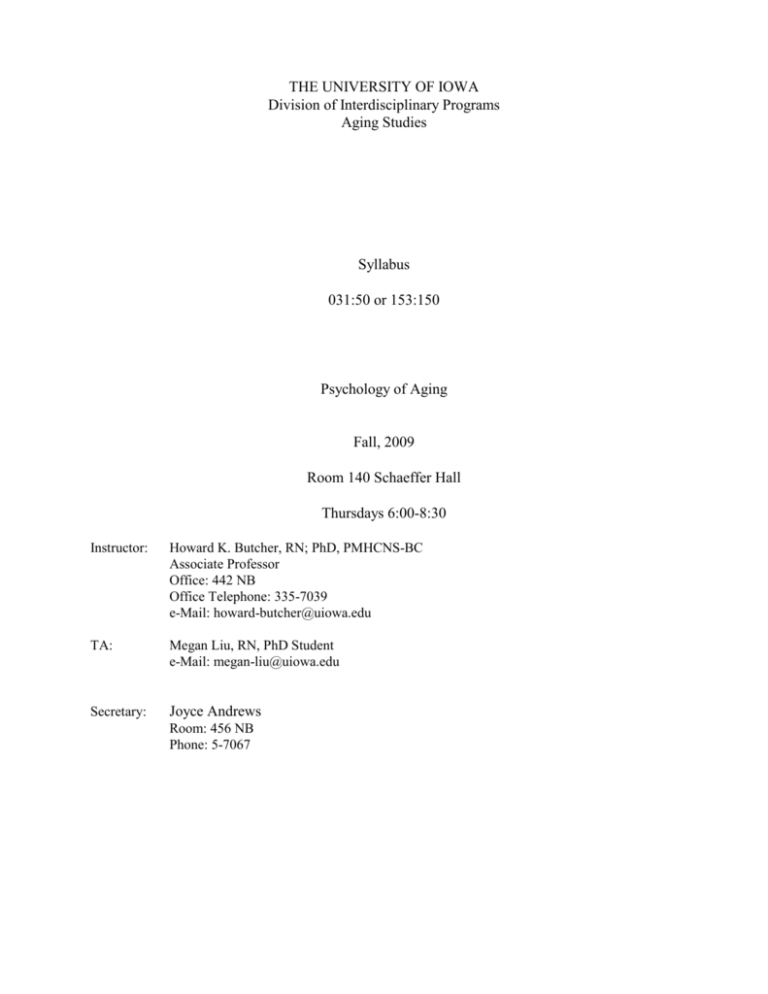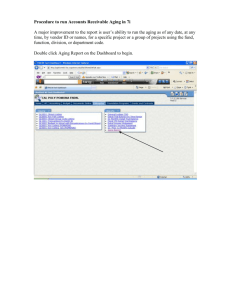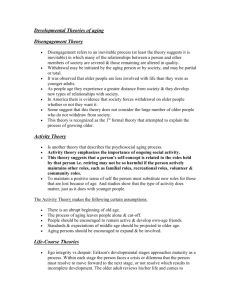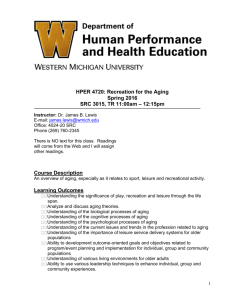
THE UNIVERSITY OF IOWA
Division of Interdisciplinary Programs
Aging Studies
Syllabus
031:50 or 153:150
Psychology of Aging
Fall, 2009
Room 140 Schaeffer Hall
Thursdays 6:00-8:30
Instructor:
Howard K. Butcher, RN; PhD, PMHCNS-BC
Associate Professor
Office: 442 NB
Office Telephone: 335-7039
e-Mail: howard-butcher@uiowa.edu
TA:
Megan Liu, RN, PhD Student
e-Mail: megan-liu@uiowa.edu
Secretary:
Joyce Andrews
Room: 456 NB
Phone: 5-7067
Copyright 2009 by THE UNIVERSITY OF IOWA. All rights reserved. No part of this material
may be reprinted, or reproduced, or utilized in any form by an electronic, mechanical, or other
means, now known or hereafter invented, including photocopying and recording, or in any
information storage and retrieval system, without permission in writing from the Publisher.
(Printed in the United States of America)
All information requested on the pages of this syllabus will be used by The University of Iowa
for the purpose of assisting you in the completion of requirements for 031:50 /153:150. No
persons outside The University are routinely provided this information, except for items of
directory information such as name and local address. If you fail to provide the required
information, The University may not be able to evaluate your performance in this course.
The nature of the learning experiences in nursing may require the viewing and discussion of
sexually explicit materials.
Collegiate Policies
Students with Disabilities
I would like to hear from anyone who has a disability which may require seating modifications or
testing accommodations or accommodations of other class requirements, so that appropriate
arrangements may be made. Please contact me after class or during my office hours. Reasonable
accommodations will be made for anyone with a disability that may require some modification of
seating, testing, or other class requirements. Students must contact Student Disability Services
(3101 Burge Hall, 335-1462) and obtain a Student Academic Accommodation Request form
(SAAR). The form will specify what course accommodations are judged reasonable for that
student. Please contact the instructor after class or during office hours so that appropriate
arrangements may be made. For more information, please refer to the College of Liberal Arts and
Sciences policy on students with disabilities in the Schedule of Courses and Liberal Arts and
Sciences Bulletin.
Student Complaint Procedures
Complaints about the instructor or teaching assistant should ordinarily be resolved with the
instructor or TA first. If the complaint is not resolved to the student's satisfaction, the student
should discuss the matter further with the instructor (if the matter involves a teaching assistant),
or the Psychology Department Coordinator of Undergraduate Studies. If the matter remains
unresolved, the student may submit a written complaint to the Associate Dean for Academic
Programs, 120 Schaeffer (335-2633).
These are the recommended procedures of the College of Liberal Arts and Sciences. However,
students always have the right to complain first to someone other than the instructor (for
instance, to the coordinator of undergraduate studies, the department chair, or the University
Ombudsperson) if they do not feel, for whatever reason, that they can directly approach the
instructor. Any member of the University community may consult the Office of the University
Ombudsperson (C108 Seashore Hall, 335-3608) for help with problems or disputes, particularly
those that do not appear resolvable through existing channels.
Plagiarism and Cheating
The College of Liberal Arts and Sciences policies regarding Plagiarism and Cheating and
examples of what constitutes these offenses can be found in the Student Academic Handbook
(http://www.clas.uiowa.edu/students/academic_handbook/ix.shtml). If the instructor suspects a
student of plagiarism or cheating, he or she must inform the student (preferably in writing) as
soon as possible after the incident has been observed or discovered. If the instructor detects
cheating or plagiarism, he or she may decide, in consultation with the Psychology Department
Coordinator of Undergraduate Studies, to reduce the student's grade on the assignment or in the
course, even to assign an F. An account of the chronology of the plagiarism or cheating incident
will be written by the instructor for the departmental chair, who will then send an endorsement of
the written report of the case to the Associate Dean for Academic Programs, 120 Schaeffer Hall.
A copy of the report must be sent to the student.
THE UNIVERSITY OF IOWA
Aging Studies
Course:
Psychology of Aging 031:50 or 153:150
Course Instructor: Howard K. Butcher, RN; PhD, PMHCNS-BC
Associate Professor
Room:
Room 140 Schaeffer Hall
Semester:
Fall 2009
Semester Hours:
3 Credit Hours
Approved GE:
None
Prerequisites:
None
Corequisites:
None
Course Description:
This course provides a comprehensive exploration of the psychology of aging. The objective is
to familiarize students with normal aspects of aging in memory, emotion, personality, work and
interpersonal relationships. The course will teach aspects of successful aging, normal aging and
age-related illness such as dementia, Alzheimer's disease, cancer and heart conditions. We will
also discuss issues around caregiving, death and dying including end of life decision making, and
coping with chronic disabling illnesses. The second half of the course will address mental health
and psychological disorders in late-life and treatments for these disorders.
Reading Content:
Readings are based on selected chapters from Whitbourne’s Adult Development and Aging:
Biopsychosocial Perspectives; a set of supplemental readings that can be downloaded as pdf files
from the ICON site; Snowdon’s “Aging with Grace” and Thomas’s “What are Old People For?:
How Elders will Save the World” as well as some selected contemporary empirical articles.
Grades are based on three noncomprehensive examinations and two brief response papers to the
Aging with Grace and the “What are Old People For” texts.
Course Objectives:
This course aims to teach you:
1) Characteristic patterns of change in healthy individuals as they age. Domains to be
examined will be changes in the body, brain, memory, intelligence, competence and
wisdom, emotion, personality, and interpersonal functioning.
2) Illnesses and psychological dysfunction that can occur in late-life but are not necessarily
linked to aging.
3) Policy and services issues as they relate to the care and well-being of the elderly.
4) Issues concerning death and dying.
5) Research methods in geropsychology and the nature and demands of multidisciplinary
research.
Course Readings:
Course readings will include articles and books from a variety of sources. All required texts are
available at the Iowa Memorial Union Bookstore. Course required books available for purchase
are:
Required Texts:
Whitbourne, S. K. (2008). Adult Development and Aging (3rd ed.). New York: Wiley.
Snowden (2001). Aging with Grace. New York: Bantam.
Thomas, W. H. (2004). What Are Old People For?: How Elders Will Save the World. Acton,
Mass: VanderWyk & Burnham
Supplemental Readings:
Supplemental readings are listed in the syllabus and may be accessed from the ICON site and
downloaded as pdf files.
Grading is as follows:
4.33 98-100 = A+
4.00 94- 97 = A
3.67 90- 93 = A-
3.33 87-89 = B+
3.00 84-86 = B
2.67 80-83 = B-
2.33 76-79 = C+
2.00 71-75 = C
1.67 68-70 = C-
Assignments:
Exam 1
Exam 2
Aging with Grace Paper
What are old people for? Paper
Final
20%
20%
20%
20%
20%
Oct 1
Nov 19
Oct 22
Dec 3
TBA
To pass the class, all 3 examinations must be taken and all writing assignments must be
completed.
Examinations:
Examinations will be composed of objective multiple choice questions that will require you to
integrate the knowledge you have learned. There are very few excusable reasons for missing a
test. University regulations require that students be allowed to make up examinations that have
been missed due to illness, mandatory religious obligations, or other unavoidable circumstances
or University activities. If you know you must be away at the time of an examination for
mandatory religious obligations or university activities, the instructor or TA must be contacted in
advance to schedule a make-up examination. Illness at the time of an examination must be
documented by note from a physician; any other circumstances must be documented by the
University of Iowa Explanatory Statement for Absence from Class and approved by the
instructor. To be eligible for a makeup exam, the instructor or TA must be contacted before
the examination. Questions, comments or complaints about specific test items must be
submitted in writing to your teaching assistant or to the professor within a week of receiving your
test score. In case of conflicts, requests to change timing of final exam must be filed with the
Registrar's office by the deadline indicated in the Guide to Fall Courses. NOTE: EXAM times
and places may change if scheduled rooms become unavailable.
Reaction Papers:
The reaction paper and homework assignments are brief responses to questions provided by the
instructor in order to guide your reading of the assigned material. These papers will not require
any additional research. They only require careful reading of the texts and thoughtful response to
the questions asked. Students are expected to check their writing equipment well in advance;
last minute failure of printers, discs, etc. is not an acceptable excuse for tardiness. Late
papers will be penalized 5 points if not handed in at the scheduled time. Papers turned in
more than a week late will receive an additional 5 point penalty; those that are more than 2
weeks late will receive 0 points, but still must be submitted before the final exam to pass the
class.
Tentative Schedule
Psychology of Aging
Required Readings
Week 1 8/27
Whitbourne Chapter 1
Emerging Suppl.
Ayres Suppl.
Edwards Suppl.
Pipher Suppl.
Crary Suppl.
Whitbourne Cptr 2
Salthouse Suppl.
Davidson Suppl.
Introduction to Geropsychology: History, Theory and
Trends in Aging.
Week 3 9/10
Whitbourne p. 158-175
Kramer Suppl.
The Aging Brain & Wisdom
Week 4 9/17
Alzheimer's and Memory
Week 5 9/24
Whitbourne Chapter 6 pp.128138) Chapter 7
Whitbourne Cptr 7
Week 6 10/1
Exam Only
EXAM # 1
Week 7 10/8
Whitbourne Cptr 8
Carstensen and Charles Suppl.
Aging and Personality
Week 8 10/15
Whitbourne Cptr 8
Whitbourne Cptr 9
Whitbourne Cptr 9
Emotion
Week 2 9/3
Week 9 10/22
Week 10 10/29
Week 11 11/5
Week 12 11/12
Week 13 11/19
Week 14 11/26
Week 15 12/3
Week 16 12/10
Whitbourne, Chapt 10
Whitbourne Cptr 11 & 12
Butcher Suppl.
Whitbourne Cptr13
Martinez Suppl.
Blank Suppl.
Exam Only
Thanksgiving
Whitbourne Cptr 11 & 12
Whitbourne Cptr 14
Rowe and Kahn Suppl.
FINALS WEEK FINAL EXAM
Week 17 12/14-18
Theories of Aging and Development
Memory, Attention, Intelligence and Aging
Relationships Continued: Work and Retirement, and
Leisure
10/22 “Aging with Grace” Paper Due- Discussion
of Aging with Grace
Caregiving, Elder Abuse, Work. Retirement
Mental Health and Aging, Depression
Death and Dying
EXAM # 2
No Class
Mental Health and Aging: Anxiety Disorders,
Substance
12/3 “What are old people for?: How elders will
save the world” Paper due.
Successful Aging
TBA
Supplemental Required Readings
These are the articles in .pdf format that you can download from the course ICON site. As the
semester goes, I may find other excellent relevant articles that I may add to this list and
onto the course ICON site.
Ayres, R. (2004, September/October). The economic conundrum of an aging population. World
Watch Magazine, pp. 45-49.
Blank, RH (2001) Technology and death policy: Redefining death. Morality, 6.
Butcher, H.K., & McGonigal-Kenney, M. (2005). Depression & dispiritedness in later life: A
‘gray drizzle of horror isn’t inevitable. American Journal of Nursing, 105 (12), 52-62.
Butcher, H.K. (2003). Aging as emerging brilliance: Advancing Rogers’ unitary theory of aging.
Visions: The Journal of Rogerian Nursing Science, 11, 55-66.
Crary, D. (2004). Ageism in America. From the Terre Haute Tribune-Star, Sept. 5, pp. D1.
Carstensen, L.L., Charles, S.T. (1998) . Emotion in the Second Half of Life. Current Directions
in Psychological Science, 7, 144-149.
Davidson, S. (2007). A longer, better life: Sara Davidson talks to two medical scientists about
how the body ages and the research on trying to extend our healthy life span. New York
Times Magazine, May 6, 2007.
Edwards, M. (2004, November/December). As good as it gets. AARP Magazine, 47-53.
Kramer, A.F., Fabiani, M., & Colcombe, S.J. (2006). Contributions of cognitive neuroscience to
the understanding of behavior and aging. In J. Birren & K. Schaie, K. Handbook of the
Psychology of Aging (Sixth Edition) (pp. 57-83). St. Louis: Elsevier.
Martinez, E. (2001). Chapter 3. In. J. Freeman & K. McDonnell (Second edition). Tough
decisions: Cases in medical ethics (pp. 17-30) Oxford: Oxford University Press
Pipher, M. (2002). Society fears the aging process. Excerpted from M. Pipher Another Country:
Navigating the emotional terrain of our elders.
Rowe, J. W. & Kahn, R.L. (1998). The structure of successful aging. In John W. Rowe & Robert
L. Kahn. Successful Aging. Dell, New York.
Salthouse, T.A. (2006). Theoretical issues in the psychology of aging. In J. Birren & K. Schaie
Handbook of the Psychology of Aging (Sixth Edition) (pp. 3-13). St. Louis: Elsevier.
Guidelines to Curious Case of Benjamin Button Paper
Psychology of Aging
I assigned Curious Case of Benjamin Button because it comprises a number of relevant topics
covered in this course. This assignment is an alternative option for the Snowden (2001). Aging
with Grace. If you chose not to do the assignment on this film, then follow the guidelines for the
Aging with Grace paper in the syllabus. Before starting to watch the film, you should review the
questions below. Choose any one of these questions for you paper.
1. How is aging represented in a positive way and what are some examples? How ageist
attitudes expressed and what are some examples? What would you do to combat ageism
at the individual, family and community level?
2. Describe how (by providing detailed descriptions) Benjamin or Daisy adjusted to his or
her physical, psychological, and social changes due to aging and growing younger?
3. Describe how psychological aspects of the dying process were presented in the film?
The papers should not be longer than 5 pages long, double-spaced with 12-point font. Use the
two questions you choose to answer to help organize your paper. PLEASE contact the course TA
if you are struggling with any of the questions.
Your grades will be based on: 1) the written quality of your paper; and 2) the depth of your
descriptions and how well you connect the aspects of the film to biopsychosocial aspects of the
aging process.
The paper will not require any additional research. It only requires careful watching of Curious
Case of Benjamin Button and thoughtful response to the questions asked. Students are expected
to check their writing equipment well in advance; last minute failure of printers, discs, etc. is
not an acceptable excuse for tardiness. Papers will be graded on the basis of content and
quality of writing (including organization, clarity, spelling, grammar). Late papers will be
penalized 5 points if not handed in at the scheduled time. Papers turned in more than a
week late will receive an additional penalty of 5 points; those that are more than 2 weeks
late will receive 0 points, but still must hand in the paper before the final exam.
Upload your paper to the DropBox by October 22, 2009. This paper is worth 20% of your
final grade.
Guideline to Aging with Grace Paper
I assigned Aging with Grace because it provides insight into what it is like to conduct aging
research. Although the Nun study is a unique and extraordinary study, many of the issues
discussed and the domains investigated are common to many studies of aging researchparticularly those interested in “Successful Aging”. Before starting the book, please review the
questions below. I would like you to answer these questions after reading the book, so
highlighting relevant areas in the text will be helpful.
1) Dr. Snowden had to maintain a strong working relationship with the Sister’s of Notre Dame
for many years. Throughout the book he describes some of the delicate issues that arise.
Choose one of the following situations that arose and describe 1) How Dr. Snowden handled
it and 2) whether or not you agree with how he handled it and why. If you say that you don’t
agree with how he handled it YOU HAVE TO state how you would have done it differently.
a) When study participants learn about study findings through the popular or scientific
press (e.g. the relation between education and mortality).
b) When study participants ask for feedback on the tests they undergo, such as when they
ask for their genetic information.
c) When Dr. Snowdon required that study participants donate their brain if they wanted
to participate in the study.
2) List TWO separate reasons why studying the Sisters of Notre Dame is a good idea from a
scientific standpoint. I want to know why choosing a cloistered set of nuns is better than just
going out into the community or going to a clinic and studying Alzheimer’s disease. Be sure
to address how this decision bears on the difficulty in teasing apart environmental from
genetic causes.
3) The Nun Study was designed to determine behaviors one could engage in to prevent dementia
or Alzheimer’s disease. List two behaviors examined in the study and whether or not the data
collected supported their effectiveness in preventing or delaying Alzheimer’s disease.
I would like the papers to be 5 pages long, double spaced with 12 point font. PLEASE contact
the course TA if you are struggling with any of the questions.
Your grades will be based on 1) how accurate you are in reporting what happened in the book
and 2) how well you support your own opinions.
The paper will not require any additional research. It only requires careful reading of Aging with
Grace and thoughtful response to the questions asked. Students are expected to check their
writing equipment well in advance; last minute failure of printers, discs, etc. is not an
acceptable excuse for tardiness. Papers will be graded on the basis of content and quality of
writing (including organization, clarity, spelling, grammar). Late papers will be penalized 5
points if not handed in at the scheduled time. Papers turned in more than a week late will
receive an additional penalty of 5 points; those that are more than 2 weeks late will receive
0 points, but still must hand in the paper before the final exam.
Guideline to What Are Old People For?: How Elders Will Save the World Paper
This assignment combines an interview with an older person and your own reflections. Dr.
Thomas presents innovative thoughts and strong personal opinions about what it means to be
human with advancing age. As you are reading please note THREE topics or quotes that peak
your curiosity, formulate questions based on these topics and elicit responses from an elder either
through letter writing or an interview.
Outline for reader response and interview based on “What are old people for?”
1. Briefly describe the interview setting and your informant while observing rules of
confidentiality. How old is your informant? Why did you choose this person? (.5 page)
2. 3 quotes and questions (1 page each): Each 1-sentence quote must be from a different one
of the 8 main chapters of the book. Summarize the author’s intended meaning. Formulate
a one-sentence question to allow your informant to reflect about the topic. Summarize
these reflections. Did Dr. Thomas’ theories ring true for this informant?
3. Summary (1.5 page): What developmental tasks is this person grappling with? What does
“home” mean for this person? How well does our current approach of mitigated aging
work out for this person?
I would like the papers to be 5 pages long, double spaced with 12 point font. PLEASE contact
the course TA if you are struggling with any of the questions.
Your grades will be based on 1) how accurate you are in summarizing the author’s theory, and 2)
how well you support your own opinions and those of your informant based on the author’s
theory.
The paper will not require any additional research. It only requires careful reading of Aging with
Grace and thoughtful response to the questions asked. Students are expected to check their
writing equipment well in advance; last minute failure of printers, discs, etc. is not an
acceptable excuse for tardiness. Papers will be graded on the basis of content and quality of
writing (including organization, clarity, spelling, grammar). Late papers will be penalized 5
points if not handed in at the scheduled time. Papers turned in more than a week late will
receive an additional penalty of 5 points; those that are more than 2 weeks late will receive
0 points, but still must hand in the paper before the final exam.






